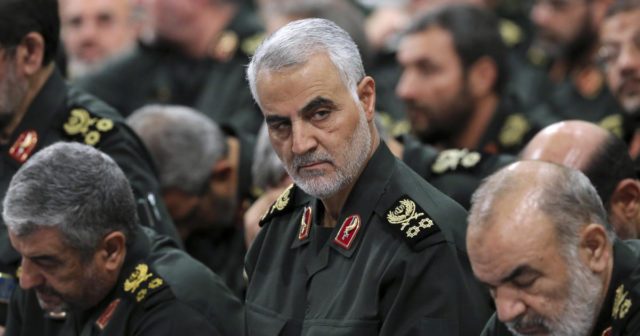Iranian Revolutionary Guard Corps (IRGC) Qods Force Commander Qassem Soleimani is no more. He died with the blood of tens of thousands of people on his hands — Americans, Syrians, Kurds, Israelis, Lebanese, Iraqis, Pakistanis, Afghans, Africans in Nigeria, Chad, Mali, and more. He was an enemy combatant of the United States and leader of a U.S.-designated Foreign Terrorist Organization.
It is tempting just to say, “yippie” and move on. But the extraordinary number of people — including Americans, including The New York Times, including House Speaker Nancy Pelosi (D-CA) and Senate Minority Leader Chuck Schumer (D-NY) — disapproving of President Donald Trump’s decision to have our military skillfully dispatch Soleimani to wherever he’s gone requires more comment.
The Times began its story with, “Mr. Trump’s decision to kill General Soleimani was one that Presidents George W. Bush and Barack Obama had rejected, fearing it would lead to war.” The Times makes the fundamental mistake: Nothing the United States does will “lead to war.” The war is already 40 years old — we just haven’t been fighting it much.
Iran declared real and operational war on the United States (and Israel) at the onset of the Islamic Republic in 1979. From the U.S. embassy takeover in 1979 to the Beirut Marine Barracks bombing in 1983 to the attacks against American troops in Iraq to the bomb plots against the Saudi ambassador in Washington and the Israeli embassy in 2011 to the capture of American naval personnel in 2016 (and major violations of the Americans’ Geneva Convention rights) to the continuing Iranian harassment of U.S. shipping in the Persian Gulf and Bab-el-Mandeb Straits, Iran has killed Americans and threatened to kill more.
Soleimani was head of the Iranian militias that killed 608 American soldiers in Iraq and maimed thousands of others through the use of IEDs. He armed, trained, and commanded the Iraqi Kataib militia Hezbollah that was responsible for the killing of an American contractor in Iraq and the injuring of several American soldiers — and for attacking the U.S. embassy in Baghdad, which directly precipitated the current situation.
And that’s only about the United States. Soleimani’s IRGC-controlled militias sent tens of thousands of troops, mostly Pakistani and Afghan, to Syria to commit large-scale ethnic cleansing of Syrian Sunnis and precipitating the Syrian refugee crisis in Europe. Soleimani’s IRGC-controlled militias ostensibly fought against ISIS in western Iraq, but committed a variety of crimes against Iraqi Sunni civilians there, as well. The arming of Hezbollah in Lebanon with precision missiles, now aimed at Israel, is a Soleimani-led IRGC operation. The establishment of Iranian missile factories in Lebanon, Syria, and Iraq is a Soleimani-led IRGC operation.
At home, Pelosi and Schumer think Congress should have been notified — asserting a privilege that does not exist. For the record, President Barack Obama put American citizen Anwar al-Awlaki on a CIA “kill list” in 2010 without discussion in Congress, let alone prior congressional approval. Al-Awlaki was dispatched by an American drone in Yemen in 2011.
Others, including Democratic presidential hopefuls Joe Biden, Elizabeth Warren, and Andrew Yang, are condemning the elimination of Soleimani out of fear of the retaliation that Iran might try to exact. Those people aren’t actually wrong. But if they believe the United States should ignore Iranian provocation or abandon the Middle East to protect ourselves here at home — it’s too late for that.
Just last month, Ali Hourani, an American citizen, was sentenced to 40 years in federal prison for “helping Hezbollah and Iran prepare to strike strategic and vulnerable targets around New York City, such as federal facilities housing day care centers, critical infrastructure, counterterrorism command posts, and international airports, as well as members of the NYPD, the Mossad, and the Israel Defense Forces,” according to the federal sentencing memo.
Anything Hezbollah knows, Iran knows.
That, however, is less a reason to condemn the elimination of Soleimani than to understand the breadth and depth of the war Iran has long been waging. The present escalation of that war is a sign that the Iranian empire has overreached, is collapsing, and needs a “victory” against the mullahs’ “Great Satan” (U.S.) or the “Little Satan” (Israel) to justify its continued existence.
The Trump administration has cut off Iran’s money supply and other countries have stopped trading with Iran, making bribery in the form of cash, weapons, arms factories, and training less and less possible. The regime, reduced to stealing Iraqi oil to sell on the black market, faces rebellion in its provinces Lebanon and Iraq — as well as at home. Opposition to Islamist clericalism appears to be on the rise in the region.
Enemies are most dangerous when they see their demise on the horizon — the Battle of the Bulge was Hitler’s way of ensuring the greatest number of allied casualties before the end of the Nazi empire. That appears to be where Iran is now, that is why the dispatch of Soleimani was essential, and that is why Americans and our allies must present a united front against Iran.






